

Post-scarcity economy. This would require a sophisticated system of resource recycling, in conjunction with advanced productive technology that enables conditions of material abundance, such as automated systems capable of converting raw materials into finished goods[not verified in body], which in turn enable the free distribution[2] of most or all economic output and the common ownership of the means of production used therefor.
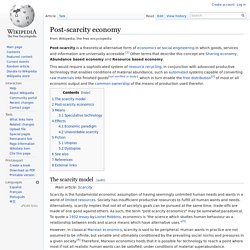
The scarcity model[edit] Scarcity is the fundamental economic assumption of having seemingly unlimited human needs and wants in a world of limited resources. Society has insufficient productive resources to fulfill all human wants and needs. Alternatively, scarcity implies that not all of society's goals can be pursued at the same time; trade-offs are made of one good against others.
As such, the term "post-scarcity economics" may be somewhat paradoxical. Abundance. Abundance may refer to: In science and technology: In literature: In business: Abundance Generation, a renewable energy investment platform See also: Neighbourhood. A neighbourhood (Commonwealth English), or neighborhood (American English), is a geographically localised community within a larger city, town, suburb or rural area.
Neighbourhoods are often social communities with considerable face-to-face interaction among members. "Researchers have not agreed on an exact definition. Neighbourhood is generally defined spatially as a specific geographic area and functionally as a set of social networks. Neighbourhoods, then, are the spatial units in which face-to-face social interactions occur – the personal settings and situations where residents seek to realise common values, socialise youth, and maintain effective social control. Preindustrial cities[edit] Neighbourhoods are typically generated by social interaction among people living near one another.
Subsidiarity. Subsidiarity is an organizing principle of decentralisation, stating that a matter ought to be handled by the smallest, lowest, or least centralised authority capable of addressing that matter effectively.
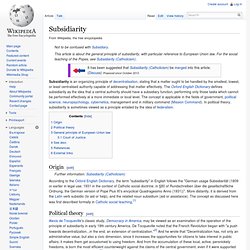
The Oxford English Dictionary defines subsidiarity as the idea that a central authority should have a subsidiary function, performing only those tasks which cannot be performed effectively at a more immediate or local level. Glocalisation. Glocalization (a portmanteau of globalization and localization) is a term denoting the adaptation of a product or service specifically to each locality or culture in which it is sold.
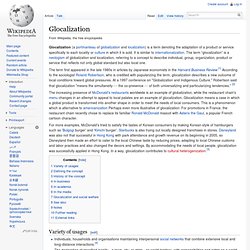
It is similar to internationalization. The term “glocalization” is a neologism of globalization and localization, referring to a concept to describe individual, group, organization, product or service that reflects not only global standard but also local one. The term first appeared in the late 1980s in articles by Japanese economists in the Harvard Business Review.[1] According to the sociologist Roland Robertson, who is credited with popularizing the term, glocalization describes a new outcome of local conditions toward global pressures. At a 1997 conference on "Globalization and Indigenous Culture," Robertson said that glocalization "means the simultaneity --- the co-presence --- of both universalizing and particularizing tendencies.
" [2] Variety of usages[edit] Defining the concept[edit] Localism (politics) Localism can also refer to a systematic approach to organizing a national government so that local autonomy is retained rather than following the usual pattern of government and political power becoming centralized over time.
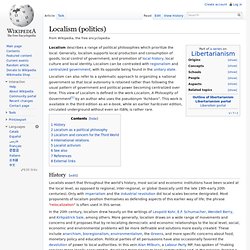
This view of Localism is defined in the work Localism, A Philosophy of Government[1] by an author who uses the pseudonym “Achbani”. This work is available in the third edition as an e-book, while an earlier hardcover edition, circulated underground without even an ISBN, is rather rare. Localists assert that throughout the world's history, most social and economic institutions have been scaled at the local level, as opposed to regional, inter-regional, or global (basically until the late 19th-early 20th centuries). Only with imperialism and the industrial revolution did local scales become denigrated.
Most proponents of localism position themselves as defending aspects of this earlier way of life; the phrase "relocalization" is often used in this sense. Distributed economy. Distributed economies (DE) is a term that was coined by Allan Johansson et al. in 2005.[1] Definition[edit] There is no official definition for DE, but it could be described as a regional approach to promote innovation by small and medium sized enterprises, as well as sustainable development. The concept is illustrated in the figure below, that shows centralised, decentralised and distributed economies respectively. Decentralization. Decentralization (or decentralisation) is the process of redistributing or dispersing functions, powers, people or things away from a central location or authority.[1][2] While centralization, especially in the governmental sphere, is widely studied and practiced, there is no common definition or understanding of decentralization.
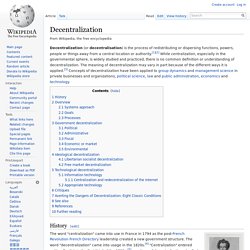
The meaning of decentralization may vary in part because of the different ways it is applied.[3] Concepts of decentralization have been applied to group dynamics and management science in private businesses and organizations, political science, law and public administration, economics and technology. History[edit] The word "centralization" came into use in France in 1794 as the post-French Revolution French Directory leadership created a new government structure. Decentralization was one of ten Megatrends identified in this best seller. According to a 1999 United Nations Development Programme report: